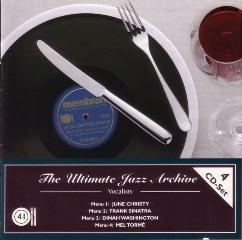The Ultimate Jazz Archive Vol.163 – Dinah Washington [1945-1953] [2005]
The Ultimate Jazz Archive Vol.163 – Dinah Washington [1945-1953] [2005]

01.Blues For A Day 02.Rich’s Man Blues 03.Pacific Coast Blues 04.Beggin’ Mama Blues 05.My Lovin’ Papa 06.Oo Wee Walkie Talkie 07.Embraceable You 08.You Can Depend On Me 09.Blow Top Blues 10.Joy Juice 11.A Slick Chick (On The Mellow Side) 12.Just One More Chance 13.Ain’t Nothin’ Good 14.Don’t Get Around Much Anymore 15.Go Pretty Daddy 16.Feel Like I Wanna Cry 17.Lean Baby 18.Never, Never 19.I Ain’t Goin’ To Cry Anymore 20.Am I Blue 21.Pennies From Heaven 22.Set Me Free 23.My Man’s An Undertaker
Dinah Washington was at once one of the most beloved and controversial singers of the mid-20th century -- beloved to her fans, devotees, and fellow singers; controversial to critics who still accuse her of selling out her art to commerce and bad taste. Her principal sin, apparently, was to cultivate a distinctive vocal style that was at home in all kinds of music, be it R&B, blues, jazz, middle of the road pop -- and she probably would have made a fine gospel or country singer had she the time. Hers was a gritty, salty, high-pitched voice, marked by absolute clarity of diction and clipped, bluesy phrasing. Washington's personal life was turbulent, with seven marriages behind her, and her interpretations showed it, for she displayed a tough, totally unsentimental, yet still gripping hold on the universal subject of lost love. She has had a huge influence on R&B and jazz singers who have followed in her wake, notably Nancy Wilson, Esther Phillips, and Diane Schuur, and her music is abundantly available nowadays via the huge seven-volume series The Complete Dinah Washington on Mercury.
Born Ruth Lee Jones, she moved to Chicago at age three and was raised in a world of gospel, playing the piano and directing her church choir. At 15, after winning an amateur contest at the Regal Theatre, she began performing in nightclubs as a pianist and singer, opening at the Garrick Bar in 1942. Talent manager Joe Glaser heard her there and recommended her to Lionel Hampton, who asked her to join his band. Hampton says that it was he who gave Ruth Jones the name Dinah Washington, although other sources claim it was Glaser or the manager of the Garrick Bar. In any case, she stayed with Hampton from 1943 to 1946 and made her recording debut for Keynote at the end of 1943 in a blues session organized by Leonard Feather with a sextet drawn from the Hampton band. With Feather's "Evil Gal Blues" as her first hit, the records took off, and by the time she left Hampton to go solo, Washington was already an R&B headliner. Signing with the young Mercury label, Washington produced an enviable string of Top Ten hits on the R&B charts from 1948 to 1955, singing blues, standards, novelties, pop covers, even Hank Williams' "Cold, Cold Heart." She also recorded many straight jazz sessions with big bands and small combos, most memorably with Clifford Brown on Dinah Jams but also with Cannonball Adderley, Clark Terry, Ben Webster, Wynton Kelly, and the young Joe Zawinul (who was her regular accompanist for a couple of years).
In 1959, Washington made a sudden breakthrough into the mainstream pop market with "What a Diff'rence a Day Makes," a revival of a Dorsey Brothers hit set to a Latin American bolero tune. For the rest of her career, she would concentrate on singing ballads backed by lush orchestrations for Mercury and Roulette, a formula similar to that of another R&B-based singer at that time, Ray Charles, and one that drew plenty of fire from critics even though her basic vocal approach had not changed one iota. Although her later records could be as banal as any easy listening dross of the period, there are gems to be found, like Billie Holiday's "Don't Explain," which has a beautiful, bluesy Ernie Wilkins chart conducted by Quincy Jones. Struggling with a weight problem, Washington died of an accidental overdose of diet pills mixed with alcohol at the tragically early age of 39, still in peak voice, still singing the blues in an L.A. club only two weeks before the end. --- Richard S. Ginell, Rovi
download: uploaded yandex 4shared mediafire solidfiles mega filecloudio anonfiles oboom
Last Updated (Sunday, 27 April 2014 20:01)








